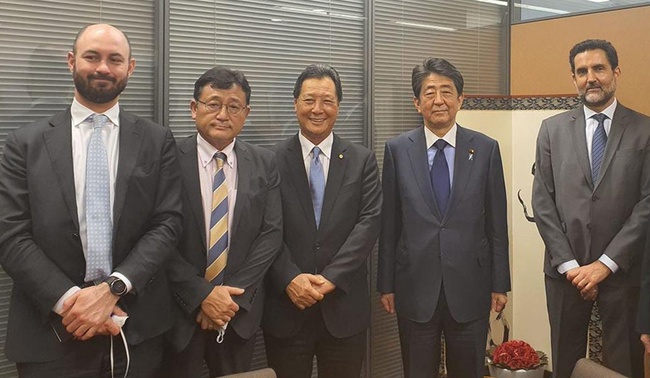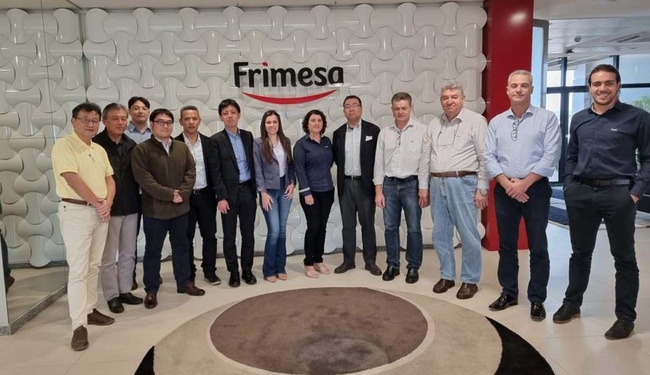For the 14th installment, we spoke with Kenichi Kodera (66, Hokkaido), president of Brazil Food Services, who has a 40-year career in purchasing and exporting meat and seafood products in Asia and South America, and has been developing new agricultural and livestock businesses in South America for the past 34 years.
To Chile and then to Brazil
Mr. Kodera's connection with South America dates back to his youth. As a student, he was passionate about mountaineering as part of an expedition club, and aimed to climb a 6,000m mountain in the Himalayas. However, just before reaching the summit, a huge storm hit and he was forced to descend. Feeling that he had not yet achieved his goal, after graduating from university, he was invited by a friend to join a Patagonia expedition team.
He saved up money on the ship for six months and taught himself Spanish. When he entered Chile, he was interviewed by the local media. The arrival of a Japanese person caused a frenzy in the rural town, so he extended his planned return home after two months. Working under a Japanese manager in Chile, he worked in sales of auto parts all over the country, and his dream of "working in South America" grew.
After returning to Japan, he joined Tokyo Maruichi Shoji Co., Ltd. (TMS), which has a branch in Chile, and his five years there formed the foundation for his business today. Two months after joining the company, he was sent to inspect and purchase Shishamo fish on an island in Canada, and on the way back to Anchorage, he was sent to work on a salmon processing ship for two months, which taught him the importance of seizing business opportunities in a flexible manner.
After that, he went to North Korea twice to buy pollock eggs, which Japan alone did not have enough of, and sailed off the coast of Alaska on China's first deep-sea fishing and processing vessel. He enjoyed his work, but he always had South America in his heart.
At that time, Nippon Ham, a client of his, launched a project to import directly from overseas. His understanding boss asked him, "You wanted to work in South America, right?" So he left his company on good terms and moved to Nippon Ham, saying, "If I can go to Chile," and for 15 years he served as president of the new Chile branch and later the Brazilian branch.

Developing new businesses with inspiration and curiosity
When he was appointed to Chile in 1989, Japan was at the height of its bubble economy. Nippon Ham was focusing on overseas business, with the belief that "the coming of the meat era will come to Japan," and Kodera was dedicated to developing new business at the forefront of South America.
The company was involved in the production and processing of Chilean seafood for Japan, as well as the development and purchase of "Andean highland pork," chicken from Peru and Brazil, prepared Brazilian beef products, and Uruguayan beef. In 2003, he was approached by the owner of a Chilean company with whom he had been working on a pork development project, and in 2004 he became independent in Brazil and established Andes Foods.
Andes Foods developed boiled beef intestines from Brazil as a substitute for the product banned by Japan after the outbreak of mad cow disease in the U.S. In addition to Chilean pork and beef innards, processed beef innards from Argentina, and Brazilian duck meat, the company also imports Chilean wine and olive oil to Brazil and Japan, and exports Ecuadorian shrimp to Vietnam and China.
"I still remember that day," he says, when dark clouds began to hang over his smooth business. NHK reported that "Mad Cow Disease was suspected in Brazil, and the Ministry of Agriculture, Forestry and Fisheries suspended imports." At the time, five containers that had left Brazil were at sea, and even when they arrived in Japan, they were not allowed to be unloaded at the port.
When he returned to Brazil, he was not allowed to leave because "the result of an investigation by the OIE (World Organization for Animal Health) showed that there was no case of mad cow disease in Brazil." He headed for Japan again, but the situation did not resolve, and after traveling around the world four times, he was finally able to find a place to go in Hong Kong, where someone said, "We'll take him if it's free."
As a result, the company had to go through a restructuring, including the dismissal of all 25 employees at the time. "I was really helped by my seniors at the Brazil Seiwa Juku," Kodera recalls.

Focusing on the Brazilian and Asian markets
As the saying goes, "When some gods are throwing things away, there are others who pick them up," and around the same time the company closed, Japan lifted its ban on importing pork produced in Santa Catarina in 2013. This prompted importers from Japan and Canada to visit the area to inspect the site, and the company began acting as an intermediary and consultant for these importers, leading to the founding of Brazil Food Services.
Over the past four or five years, Japan has been losing out on Brazilian chicken compared to other Asian countries. Importers from other countries highly value Brazilian producers who meet the strict standards of Japanese importers, and are able to buy at higher prices, becoming prime customers for Brazil.
"For Brazil, Japan has strict import regulations and standard requirements. But relying on China, with its uncertain economy, is risky. We are now also focusing on exporting meat to Southeast Asia, and are even considering exporting processed products from there to Japan," says Kodera, who continues to keep an eye on the latest trends in livestock farming in South America.
|
Overview of Brazil Food Service |
*This article is reprinted from the Brazil Nippo (October 14, 2023).
© 2023 Tomoko Oura








